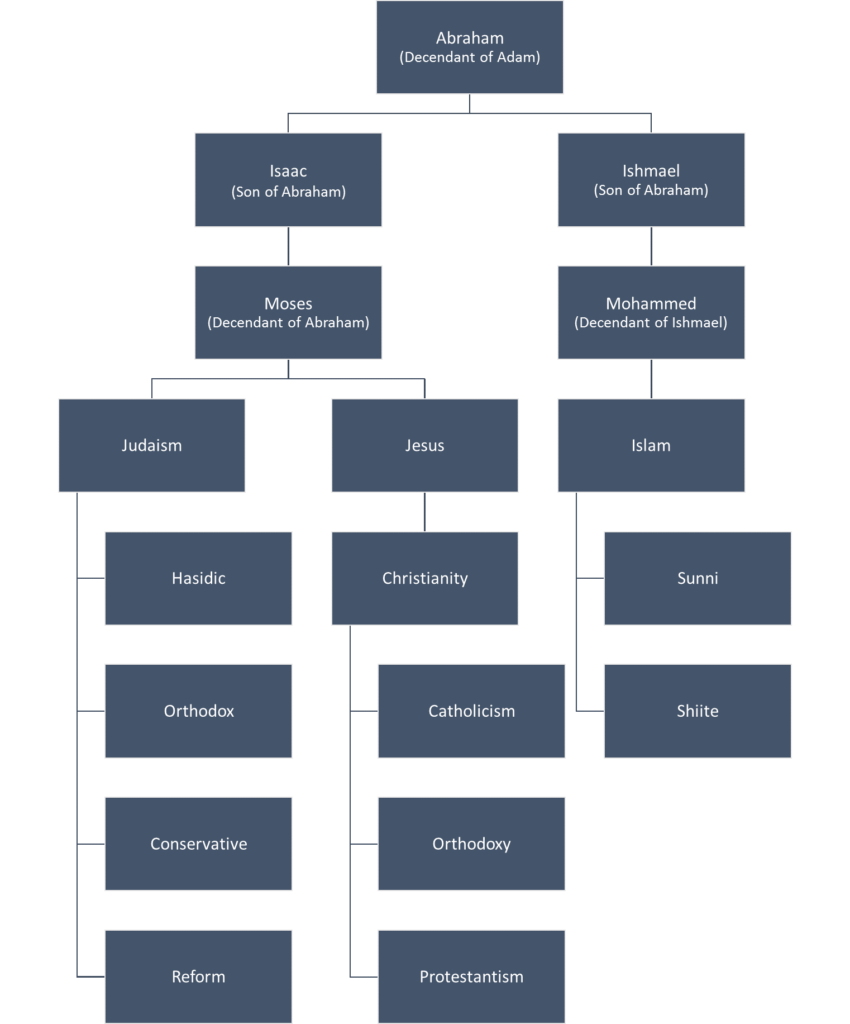Judaism
“Judaism, with its 3,000-year existence, is one of the world’s oldest living religions. Like all religions, Judaism has evolved over time, but several key beliefs pervade its rich history. First and foremost is the belief that YHWH (usually pronounced Yahweh) is the only God and creator of all. Second, humans should obey God’s law as found in both written and oral law. Third, God made a series of covenants with the Jews to designate their lineage as chosen. The most significant of these covenants are with Abraham, who received the promise of a nation, with Moses, who received the Law, and with David, who received the kingdom. Fourth is the belief that a coming King-Messiah will free the Jews from foreign domination. Unlike the other major monotheistic religions in the Western tradition – Christianity and Islam – Judaism is distinguished by being this-worldly. Although a doctrine of the afterlife can be found in its teachings, greater emphasis is placed on the nation, the land, and traditions.”
James Fieser and John Powers, Scriptures of the World’s Religions (Boston: McGraw Hill, 1998), 253.
Christianity
“Christianity is founded on the life and teachings of Jesus, a first century C.E. Jew who was executed by the Roman authorities for subversion. During its first few decades Christianity was a sect within Judaism, but quickly expanded beyond its Palestinian borders and Jewish Framework, becoming an independent religion. Two elements of Christian doctrine are essentially Jewish. First, Jesus is the messiah, or anointed king, who is spoken of in Jewish prophetic writings. The term christ is a Greek translation of the Hebrew word messiah, and so Jesus is referred to as the Christ. Second, the message of Jesus is the kingdom of God. Keeping with Jewish apocalyptic notions of the messiah, early Christians expected that the kingdom would be established by cataclysmic events. A third element of Christianity departs from its Jewish heritage, namely, that Jesus is God in human form. Building on this, a forth element is that, by his work, teachings, death, and resurrection, Jesus became the savior of the world.”
Fieser and Powers, Scriptures of the World’s, 313.
Islam
“Islam’s basic tenets are expressed in its most holy creed: “There is no God but Allah, and Muhammad is his messenger.” Islam means surrender, and adherents to the religion are called Muslims, meaning those who surrender. Staunchly monotheistic, Islam sees Allah as the omnipotent creator God who, through a series of prophets, has called people to obedience. At the end of time, Allah will resurrect the dead, condemn the wicked to hell, and entrust believers to eternal peace in his garden. Following prophets such as Moses and Jesus, Muhammad is the final and greatest prophet, who delivered the definitive expression of Allah’s voice in the Qur’an, Islam’s most holy book. Drawing on Jewish narratives, Muslims trace their religious heritage from Adam, to Noah, to Abraham, and finally, to Ishmael, Abraham’s first son. Muslim faith is embodied not only in religious practice but in a social order governed by Islamic law.”
Fieser and Powers, Scriptures of the World’s, 373.
The diagram below gives an outline of the three Abrahamic religions and how they are connected through similar heritage. The diagram below is not exhaustive, but rather gives a general outline of some of the major groups within the three different religions. You can click or tap the image to make it larger.

